David Warner tell-all: The Aussie star opens up ahead of his 100th Test match
Ahead of his 100th Test, David Warner opens up on his highs, lows and how a tough upbringing shaped the cricketer and person he has become in a gripping tell-all interview.
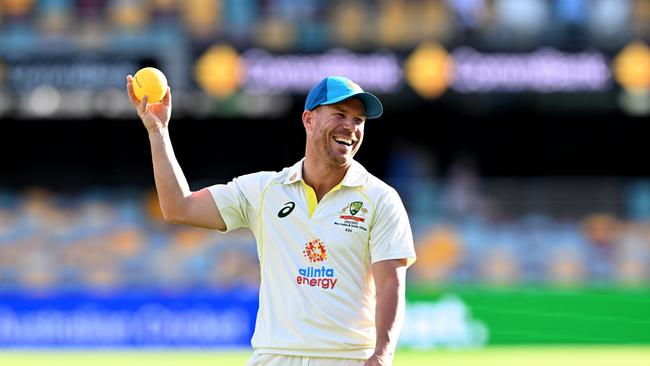
Cricket
Don't miss out on the headlines from Cricket. Followed categories will be added to My News.
David Warner has no regrets about his unique journey to 100 Tests, declaring his housing commission heritage has conditioned him to follow his heart and do the opposite of what people think.
On Boxing Day at the MCG, run-scoring machine Warner will become only the 14th Australian to bring up a century of Test matches, and he will do so as the first genuine three-format superstar the game has seen.
Warner has revealed that when he first met wife Candice, he was at a place in his career where he felt he had no one to talk to.
The game abandoned him in the wake of his alleged dust-up with Joe Root at a Birmingham pub, as it would again five years later when he was banned for 12 months over the Sandpapergate scandal.
But in former Ironwoman Candice, Warner found “someone to understand me. Someone who liked me for what I am”.
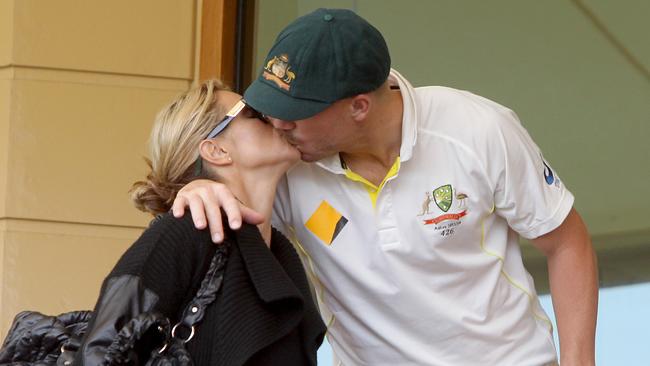
To understand what David Warner is, you only need to look at what it meant to him to be presented with his baggy green cap 11 years ago.
“What the cap represented to me was not just the fact I was representing my country but my friends and my mates who wanted to have the same dream that I had to play cricket for Australia,” Warner says.
“I feel a sense of responsibility that I’m representing them as well. I still feel that today.”
The force of nature that is Warner is a product of his working class roots. He has a fierce sense of loyalty to family and friends, and a distrust of those he feels have wronged him.
But there is a softer side.
When Warner was public enemy No.1 amid the hysteria and public lynching of Sandpapergate, one kind gesture by a Catholic Priest at an international airport brought him to tears.
“After I came back from South Africa we went to Singapore to get away, and there was this huge mass on and this Australian Priest came up to me and gave me his card,” Warner says.
“It gave me a sense of, ‘you’re still loved.’ And it really … it brought a tear to my eye.”
Asked whether he ever considered quitting Australian cricket at the height of Sandpapergate, Warner’s response is a pertinent reminder to those speculating about an imminent retirement.
“I’ve learnt to do the opposite to what people think,” Warner says.
“The reason for that is people want you to do those things, right. So for me it’s just going out there and putting myself first. And making sure that I’m in the right frame of mind to do these things.
“I’ve got a hungry appetite for being successful.”
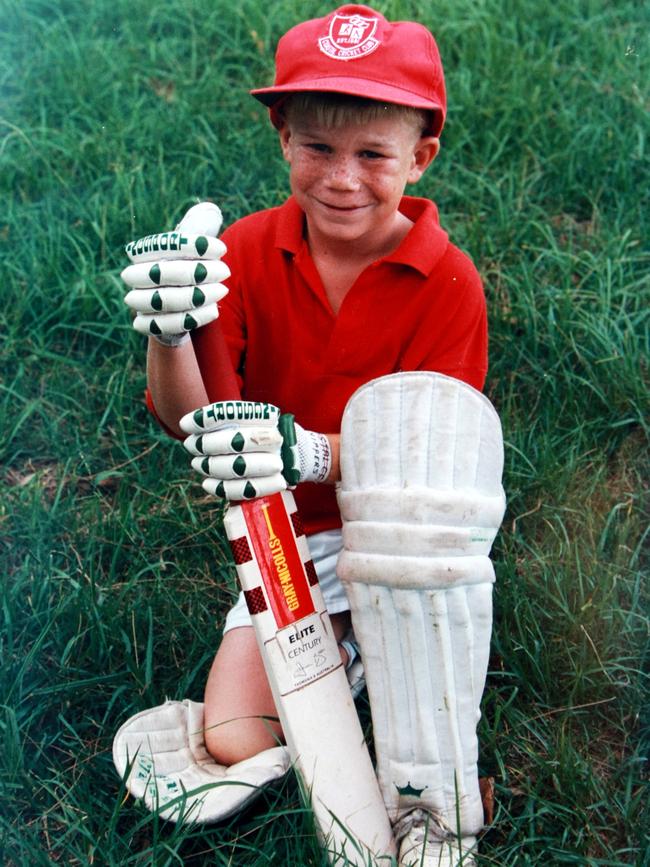
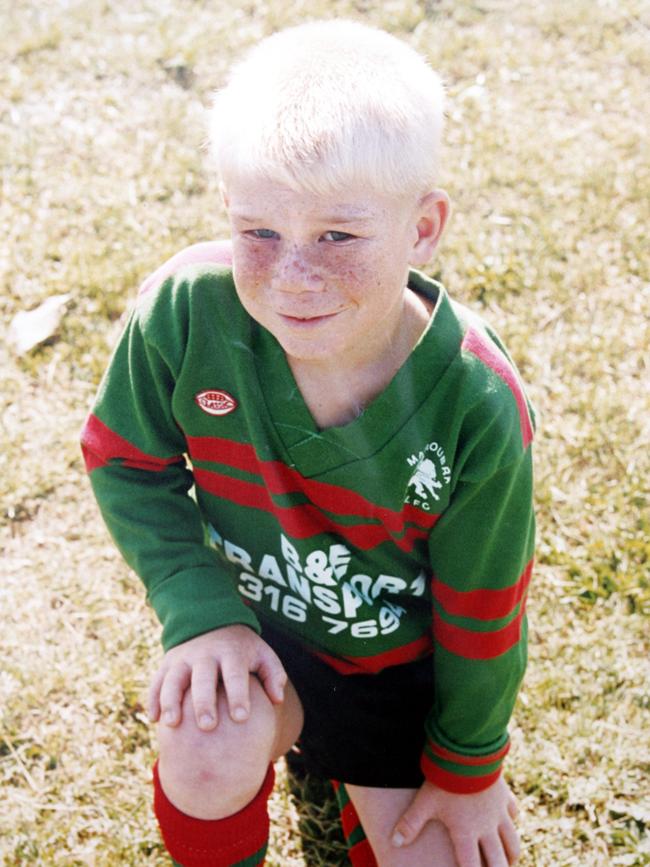
Housing commission roots
Warner grew up in a tough old neighbourhood in Sydney’s working class eastern suburbs, but he wouldn’t change a thing.
In fact, he has made a point of taking his three daughters through housing commission blocks near where they live to show them the importance of resilience.
“My mum and dad gave me a great upbringing. They both worked six days a week,” Warner told News Corp.
“I lived in a town house of 40. Outside was a little bit rough. People wouldn’t come into that area. I’ve seen some bad things, but nothing that deterred me or scared me. We were quite street smart. We knew where we could go, where not to go. Matraville is a great suburb. One thing that stood out for me was our community all stuck together no matter what. There was a fair bit of drugs and domestic violence around the area and it was challenging at times. But we were always looking out for each other. We felt a sense of security in our own little community.
“I had to go and work at 14 years and nine months at Woolworths and I worked there for six years. We were driven to work at an early age and that instilled in me what hard work was and how to get by. I enjoyed that. I would never change it.
“I think that’s why I’m so resilient and I’ve got such a strong mind. That’s why I’m so up front and I call a spade a spade.
“I get anxious when people do the wrong thing by me, because I don’t know why people can’t be honest.”
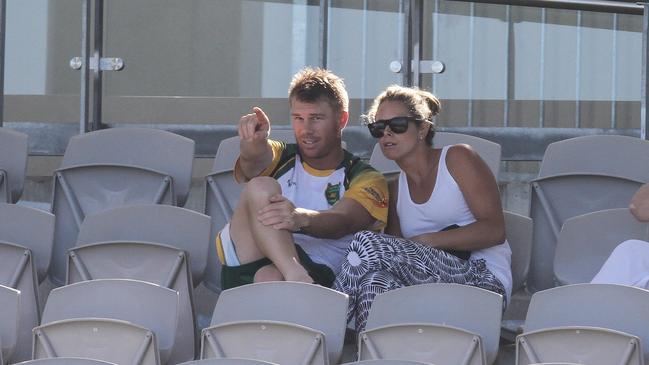
Candice turning point
Warner was sent home before a ball was bowled in the 2013 Ashes after an incident with England star Root at The Walkabout Hotel in Birmingham.
But behind the scenes, Warner had started a relationship with former Ironwoman champion Candice Falzon and after he returned from that tour, his now wife pushed him to get fit.
It was a major turning point in Warner’s career, mainly because he now had his rock.
“I didn’t feel like I had anyone to talk to back then. No one. I was different. I liked to enjoy my life,” Warner said.
“(Meeting Candice), I had someone to talk to. Someone to understand me. And someone who liked me for what I am. It was very hard to express yourself back then in the Australian team. There were people in that team who frowned upon certain things, because that’s not how they lived.
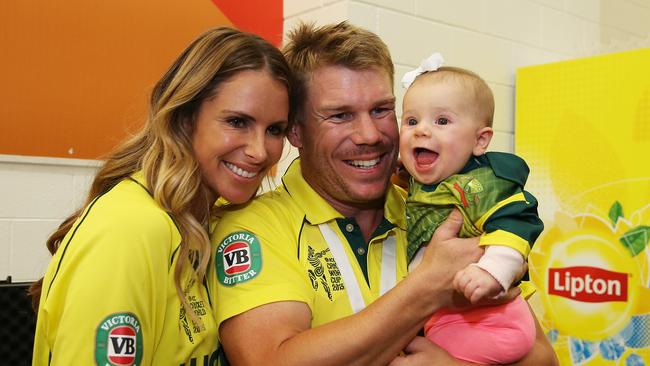
“I had no one to talk to. What highlighted that fact was obviously the incident with Joe Root. That was the big one. I had no support. None whatsoever from anyone, which was tough. When me and Candice were talking, I had someone to lean on and just speak to.
“She taught me discipline. Getting up, changing my routine, enjoying the morning and just doing things I never used to do. Train hard, stay fit, relax. She ingrained that in me.
“That shaped and moulded me into the person I am now.
“Where would I be if I wasn’t with Candice?
“Where I was back then to where I am today is chalk and cheese. In a nutshell, I probably wouldn’t have had a long a career in all three formats.”
Raising kids
Warner’s cricketing success has afforded his children a different lifestyle to what he had as a kid, but he is determined to instil in daughters Ivy, Indi and Isla the same values of hard work, family and respect.
“Our eldest, she’s eight and she has to tick off certain jobs before she earns pocket money and then if you want something, we take that out of your jar. This is what it’s going to cost,” Warner says.
“We’re trying to teach them the value of things. You have to work for it.
“From our point of view, the sense of family is important. You’ll have your niggles but you respect each other.
“Thankfully they’re very well behaved, and I think that’s because they’ve grown up around the cricket family, with a lot of older people around, so it’s created a mature environment.
“Candice is very strong on all that. She keeps the sails up at home and I owe her a lot for that.”
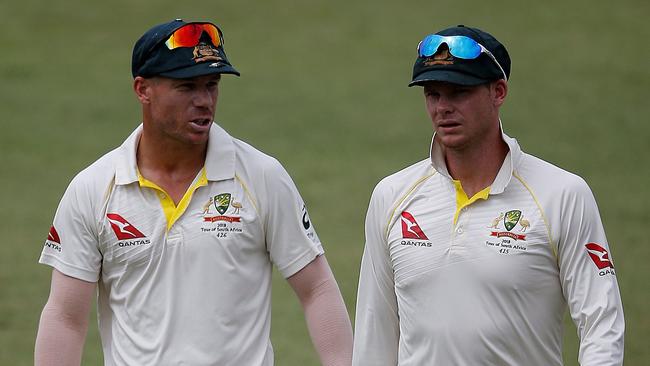
Sandpapergate
Warner said the previous Cricket Australia administration offered him no support during his Sandpapergate ban, but despite that, he never considered quitting the game.
“The people that were close to me really looked out for me. Within the organisation though, nope. None.
“Unfortunately that’s what it was like back then. You were like this washing machine. You’re just rinsed out, recycled, next player comes in. A lot has changed since then and George Bailey and Andrew McDonald are doing a great job now.
“You expect the organisation to actually support you.
“From my perspective, family was paramount (during the ban).
“And the support from the general public was also amazing. I had people coming up left right and centre.
“That got me through 2018.
“For me there were dark times, but I enjoyed the family time. I enjoyed going back to grade cricket and playing with my mates and getting an appreciation for all the volunteers who dedicate their time to cricket because they love the sport.
“I got a buzz out of that.”
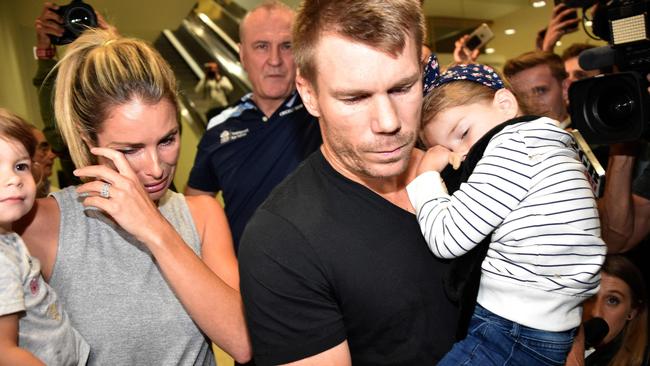
Regrets?
“I don’t regret anything. You make your own path, right? No one is perfect and you should never judge anyone until you’re perfect.
“If you try and be this robotic person and individual that wants to please everyone, it’s going to come down anyway, because you can’t please everyone.
“Whatever has happened in my past, it’s made me the individual I am and has probably got me to where I am.
“My circle around me is very, very small. They’re the only people I trust and I can always go to them for advice.
“If I did go back and make changes I wouldn’t be the person who I am and what I value.
“I’ve got no regrets, and I enjoy where I am at the moment.”
More Coverage
Originally published as David Warner tell-all: The Aussie star opens up ahead of his 100th Test match




